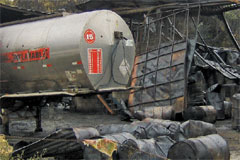Coordination of chemical issues through an inter-institutional body in Costa Rica

Costa Rica, a small Central American country, has understood the importance of integrated chemical substance management several years ago. The commitments assumed with the ratification of the different MEAs have encouraged the institutions involved in chemicals management to develop different coordination mechanisms. Those mechanisms need to be sustainable on a long term basis and have characteristics that allow them to withstand governmental changes of government.
Based on these requirements, the Technical Secretariat for the Coordination of Chemical Substance Management was created in 2006 as a support group for the national competent authorities and focal points of the different conventions. The objective of the Secretariat is to provide effective and efficient guidance on national chemicals management issues. Twenty-two institutions representing the government (e .g . customs offices), academia, NGOs and the agricultural and industrial private sectors participate in the work of the Secretariat, making it a meeting point and coordinating body for chemicals management.
The Secretariat meets regularly once a month and extraordinarily when needed. Its work plan was developed based on the work areas suggested by SAICM, adapted according to national priorities. Some elements of the Secretariat’s work plan are risk assessment and risk reduction, the enhancement of the Secretariat and capacity building. The Secretariat receives periodic reports from the convention focal points.
Activities are carried out by work groups or sub-commissions, including work groups on the following topics:
-
Pesticide management plans
-
Mercury
-
Used oils or “sludge”
-
Chemical safety including chemical emergencies
-
Sustainable purchases
-
Illegal traffic
-
Globally Harmonized System of Classification and Labelling of Chemicals (GHS)
Some successful initiatives carried out by the Secretariat are summarized below:
- Import of sludge: In 2006 the customs service detected an increase of waste oils (sludge) entering Costa Rica by ship without being controlled. Considering that these wastes could be contaminated with heavy metals or PCBs, a sub-commission was created to collect information regarding customs classifications, the amount of waste imported according to the uniform customs declarations and the companies that import and treat the sludge. With this information a technical note for the customs service was developed to regulate the import of these substances through the Basel Convention national competent authority.
- Chemical emergencies: As a result of an evaluation of the “Hazardous Chemical Substance Management in Costa Rica” done by a sub-commission of the Secretariat, a work plan on chemical emergencies was prepared. This plan includes among its activities the updating of existing regulations related to the transport of hazardous materials, the elaboration of criteria for proper storage, the establishment of an inter-institutional information system, the development of emergency response protocols and the tracking of accidents to enhance lessons learned and training programmes.
- Information management: A project funded by the SAICM Quick Start Programme is currently under execution to inter-relate existing information on chemicals throughout their entire life cycle in a national information system. This integral management of chemical substances system establishes synergies in the registering, control and follow-up of chemical substances and their wastes, as well as attends properly to technological emergencies.
-
Harmonized customs codes: Customs classification codes have been harmonized through close coordination with the customs service for all chemical substances that are included in international conventions such as the Chemical Weapons Convention (CWC), the Rotterdam Convention, the Stockholm Convention and the Montreal Protocol. This new instrument will allow stricter control of the import of regulated substances and prevent or avoid illegal traffic.
The establishment of the Secretariat has been a valuable and productive experience to enhance national coordination among the focal points of the conventions, including the Montreal Protocol. The interaction between different actors and national focal points has led to the consolidation of a strategic coordination mechanism to such an extent that it has been included in the National Development Plan for the next quadrennial.